INTERNACIONAL
¿Puede Estados Unidos sobrevivir a un partido de saboteadores?

Han pasado casi cuatro años desde que el Congreso aprobó y Donald Trump firmó una enorme ley de ayuda destinada a limitar las dificultades financieras creadas por la pandemia del COVID-19.
La Ley CARES cumplió su cometido.
 Migrantes esperan de noche junto al muro fronterizo para entregarse a los agentes de la Patrulla Fronteriza de Aduanas y Protección de Fronteras (CBP) de EE.UU. para la tramitación de solicitudes de inmigración. (Foto de Patrick T. Fallon / AFP)
Migrantes esperan de noche junto al muro fronterizo para entregarse a los agentes de la Patrulla Fronteriza de Aduanas y Protección de Fronteras (CBP) de EE.UU. para la tramitación de solicitudes de inmigración. (Foto de Patrick T. Fallon / AFP)Aunque alrededor de 25 millones de estadounidenses perdieron temporalmente sus puestos de trabajo -con las pérdidas de empleo causadas principalmente por el miedo a la infección en lugar de los cierres ordenados oficialmente- hubo mucho menos dolor monetario de lo que se podría haber esperado, dada la magnitud de la crisis de salud pública.
De hecho, según una encuesta de la Reserva Federal, el porcentaje de estadounidenses a los que «al menos les iba bien económicamente» era en realidad mayor en julio de 2020 que antes de la pandemia, presumiblemente porque para muchas personas las ayudas del gobierno, incluidos los cheques por única vez y las prestaciones por desempleo muy mejoradas, compensaron con creces la pérdida de empleos y negocios.
Diagnósticos
Además, los temores de que las generosas ayudas durante la pandemia socavaran la ética laboral de Estados Unidos -que los adultos abandonaran la población activa y no volvieran nunca más- resultaron totalmente erróneos.
Un nuevo documento de la Reserva Federal de San Francisco se titula «¿Por qué es tan alta la participación en la población activa de la primera edad?».
En él se señala que los estadounidenses de entre 25 y 54 años tienen más probabilidades de formar parte de la población activa ahora que en cualquier otro momento desde principios de la década de 2000.
Así que la Ley CARES fue un gran éxito político.
Pero dados los recientes acontecimientos políticos, me he puesto a pensar:
¿Qué habría pasado si los demócratas en 2020 se hubieran comportado como los republicanos en 2024?
Imaginemos una historia alternativa en la que Joe Biden, que para entonces ya era el gran favorito para ganar la nominación presidencial demócrata, hubiera instado a los demócratas en el Congreso a no aprobar un proyecto de ley de ayuda -de la misma manera que Trump ha intimidado a los republicanos para que voten en contra de un proyecto de ley de seguridad fronteriza– porque creía que reducir la miseria de los estadounidenses podría ayudar a Trump a ser reelegido.
Imaginemos una historia en la que Nancy Pelosi, la presidenta demócrata de la Cámara en aquel momento, se hubiera comportado como Mike Johnson, el actual presidente republicano, y hubiera impedido que llegara al pleno un proyecto de ley que intentaba abordar una prioridad nacional urgente.
Efecto electoral
Parece claro que la Ley CARES, de hecho, ayudó políticamente a los republicanos.
Es cierto que perdieron la Casa Blanca en 2020, pero por un margen menos decisivo de lo que muchos esperaban, y que aunque los demócratas ganaron el control del Senado, lo hicieron por el menor margen posible.
Seguramente a los republicanos les habría ido mucho peor si Trump hubiera estado presidiendo una depresión inducida por COVID a gran escala.
Y el GOP sigue, a día de hoy, beneficiándose de ese paquete de alivio COVID 2020. Los republicanos se jactan constantemente de lo bien que estaba la economía bajo Trump, lo cual es peculiar, dado que Trump fue el primer presidente desde Herbert Hoover en dejar la Casa Blanca con menos estadounidenses empleados que cuando se mudó.
El truco aquí es que pretenden que 2020 nunca sucedió – un juego de manos que sólo funciona porque la ayuda federal permitió a tantos estadounidenses salir de la depresión pandémica en buena forma financiera.
Ahora bien, mi historia imaginaria no sucedió y no podría haber sucedido.
Para empezar, Pelosi no es esa clase de política.
Ella es partidista, por supuesto, pero nunca, que yo sepa, se ha dedicado a la extorsión política tomando como rehén el bienestar de la nación.
Por ejemplo, en 2019, pastoreó un acuerdo bipartidista para suspender el techo de deuda, evitando una potencial crisis financiera, con un acuerdo que el propio Trump admitió que no contenía «píldoras venenosas.»
Incluso si la propia Pelosi hubiera querido llevar a cabo un sabotaje económico, sus colegas se habrían negado casi con toda seguridad.
Pero los republicanos de Trump (y los últimos acontecimientos han confirmado que Trump es realmente el dueño del Partido Republicano) son todo lo que los demócratas de 2020 no eran.
Han rechazado un proyecto de ley de seguridad fronteriza y ayuda exterior que ellos mismos exigieron y luego negociaron, uno que era mucho más duro de lo que los demócratas habrían querido.
Y ni siquiera están tratando de ocultar su cinismo desnudo.
Quieren bloquear un acuerdo fronterizo, incluso uno que les dé casi todo lo que quieren, porque cualquier acuerdo podría limitar su capacidad de atacar a Biden por este tema.
Ah, y una fracción significativa de los republicanos, Trump incluido, preferiría bloquear la ayuda a Ucrania porque, según todas las apariencias, Vladimir Putin es su tipo de hombre, y están contentos de verle aplastar a su vecino democrático.
Está claro que Biden planea hacer del sabotaje republicano un tema importante en la campaña de 2024 -al estilo de la campaña de Harry Truman contra el «Congreso que no hace nada» en 1948-, con la ventaja adicional de que esta vez los republicanos están intentando más o menos abiertamente dañar los intereses estadounidenses para obtener beneficios políticos.
Queda por ver si esta estrategia funcionará.
Pero incluso si funciona, y Biden gana -incluso si los demócratas recuperaran el control total del Congreso-, me preocupa el futuro.
Uno de los dos principales partidos políticos de Estados Unidos se dedica ahora a alcanzar el poder a toda costa y tratará de hacer ingobernable la nación cuando un demócrata se siente en la Casa Blanca.
¿Cuánto tiempo podrá sobrevivir nuestra democracia en estas condiciones?
c.2024 The New York Times Company
INTERNACIONAL
India’s Modi poised for victory as 6-week general election begins in world’s largest democracy

CHENNAI – Close to 970 million Indians start voting today as India holds its general election with polls suggesting that incumbent Prime Minister, Narendra Modi will win a third term in the world’s largest democracy.
«Many Indians view Modi as a ‘strongman figure’. None of the opposition parties can field a candidate with equal charisma. Also, they have no coherent strategy or platform except that they are ‘anti-Modi,'» 25-year-old Anandh Nair from Thiruvananthapuram in the state of Kerala recently told Fox News Digital.
Modi first became prime minister in 2014. He was then re-elected for a second term in 2019.
Nair, a student, said that «During Modi’s two terms, we actually saw the standard of living rise, especially for the middle class. Another thing was, previous leaders had been ‘wishy-washy’ about supporting our Hindu identity, almost as if they were ashamed of it. But for the BJP, there was no doubt that they showed pride. For most Indians, religion is an important part of everyday life.»
INDIAN PRIME MINISTER NARENDRA MODI VISITS KASHMIR’S MAIN CITY TO DISCUSS DEVELOPMENT PROJECTS
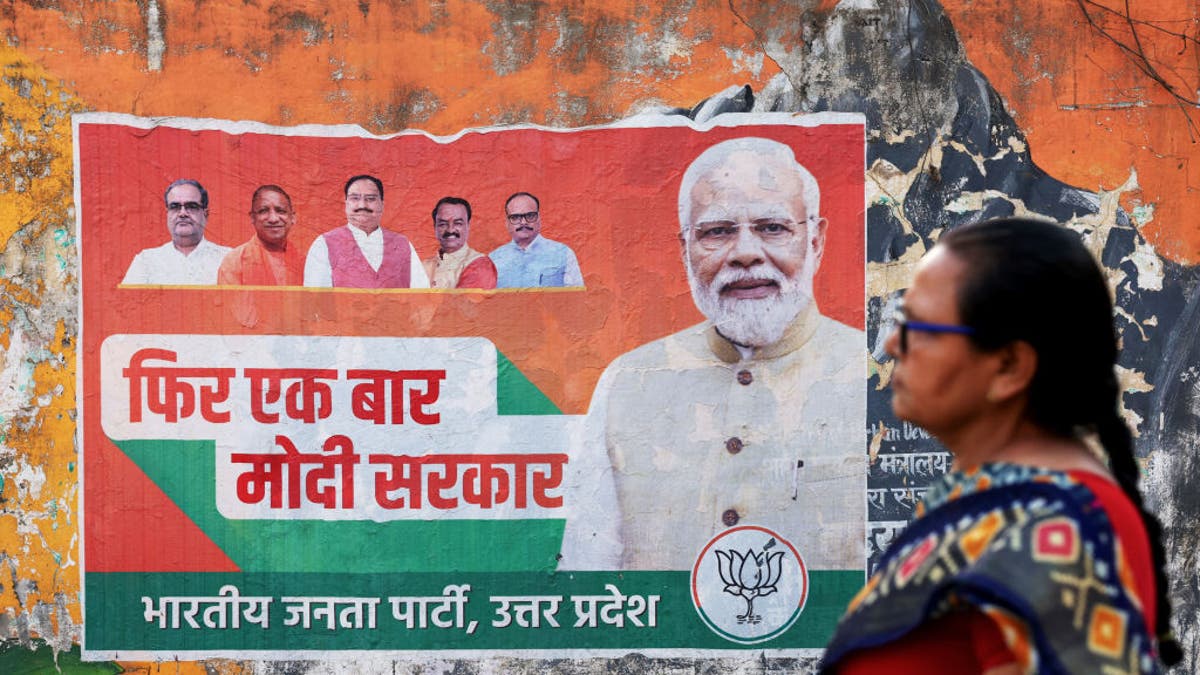
A woman walks past an election campaign poster of the Bharatiya Janata Party featuring their leader and India’s Prime Minister Narendra Modi along a street in Varanasi on March 24, 2024, ahead of the country’s upcoming general elections. (Photo by NIHARIKA KULKARNI/AFP via Getty Images)
While Modi’s Bharatiya Janata Party (BJP) has not yet succeeded in making inroads in some parts of the country, the main opposition Indian National Congress Party has dwindled in terms of the number of states it now holds, despite its previous dominance in Indian politics. Regardless, Modi has campaigned in the southern states of Tamil Nadu and Kerala recently in what many viewed as a daring step, given that the party has not fared well there.
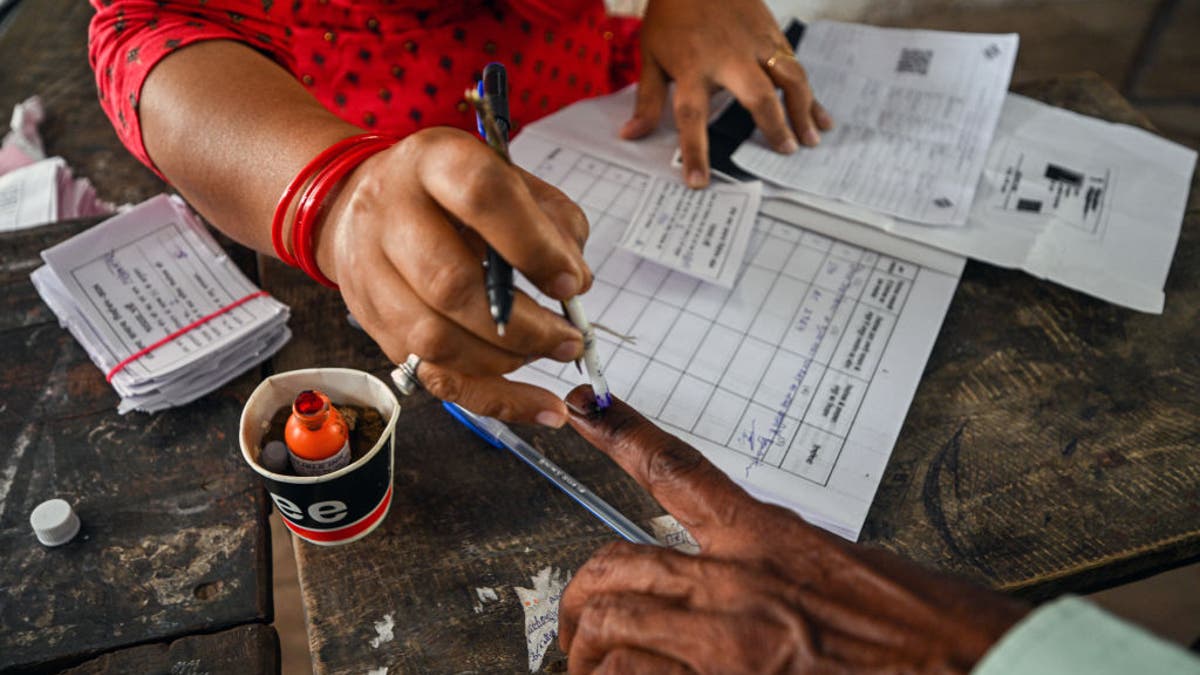
A voter’s finger marked with indelible ink after casting a ballot at a polling station during the first phase of voting for national elections in Muzaffarnagar district, Uttar Pradesh, India, on Friday, April 19, 2024. Almost 1 billion Indians begin voting today in elections lasting more than six weeks, weighing up whether to hand Prime Minister Narendra Modi a third five-year term to continue his mix of economic and Hindu nationalist policies. Photographer: Prakash Singh/Bloomberg via Getty Images
Gurdas Rao, a tour guide from Mumbai, told Fox News Digital that, «Modi is popular among both the rich and poor. All of us have seen the quality-of-life skyrocket, so why won’t we vote for him again?».
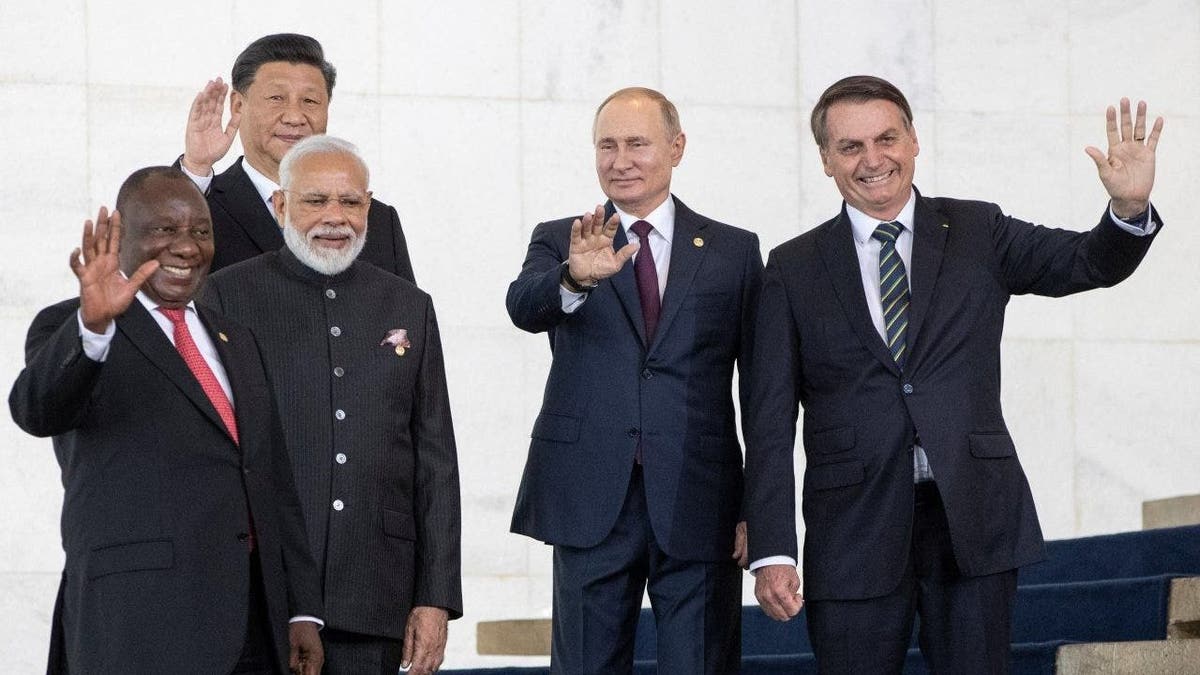
From left to right, South African President Cyril Ramaphosa, Chinese President Xi Jinping, Indian Prime Minister Narendra Modi, Russian President Vladimir Putin and Brazil’s former President Jair Bolsonaro pose for a photo at the BRICS summit in Brasilia, Brazil, on Nov. 14, 2019. (Pavel Golovkin/Pool via REUTERS)
India’s economic success in the face of the economic crisis following the COVID-19 pandemic was most notable when regional neighbors, Sri Lanka and Pakistan, faced major challenges as they ran out of foreign reserves. In contrast, India stayed relatively unscathed. This culminated when India came to Sri Lanka’s rescue, providing much needed fuel resources during its economic crisis in 2022. Both the IMF and the World Bank also estimated that India was the fastest growing economy in 2023.
A significant event was when the 73-year-old Modi attended the groundbreaking opening of the Ram Mandhir, a new temple in Ayodhya and described this as fulfilling «dreams that many generations have cherished for years». This was at the holy site believed by Hindus to be the birthplace of the legendary King Rama.
MILLIONS IN INDIA CELEBRATE AS TEMPLE BUILT ON RUINS OF HISTORIC MOSQUE
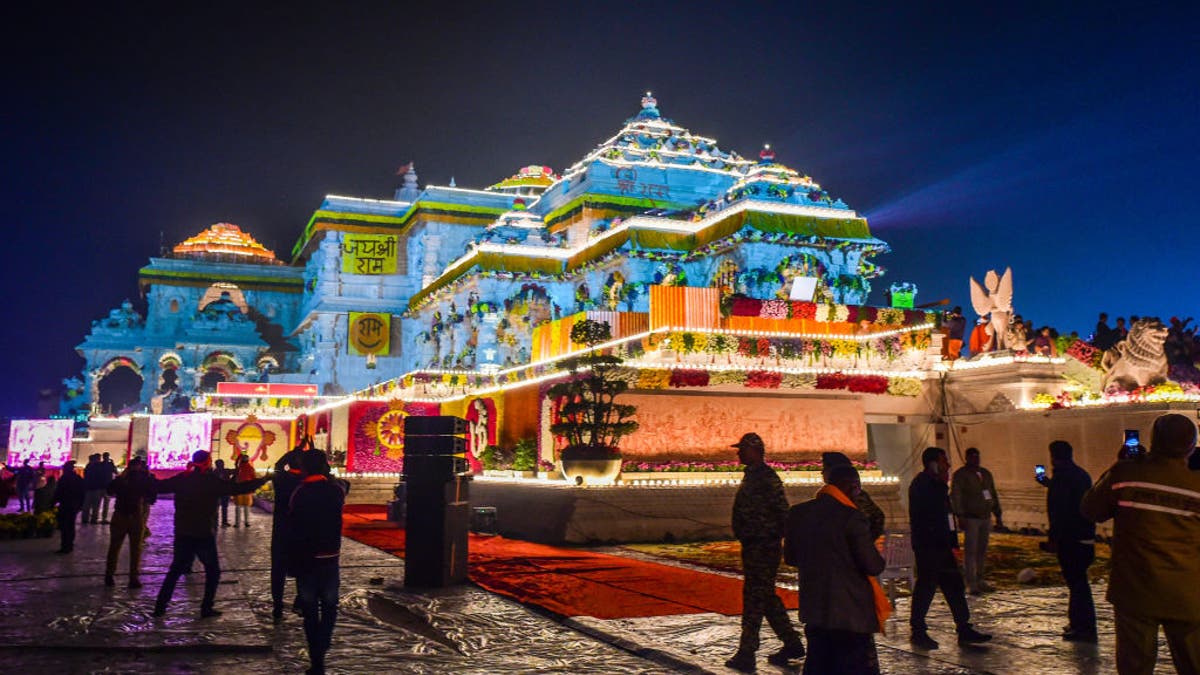
A general view of the Ram Mandir on the day of its consecration ceremony on Jan. 22, 2024 in Ayodhya, India. (Photo by Ritesh Shukla/Getty Images)
It opened, despite much controversy surrounding the temple being built on top of a razed mosque, leaving the nation divided along religious lines. Many among the Hindu majority showed positive responses, while religious minorities seemed less satisfied.
Prince Samuels, a Christian from Goa, told Fox News Digital that «India is a very diverse country: we have churches, mosques and temples; all on the same street. The BJP is catering to the Hindu majority and not incorporating our religious and culture diversity into their vision of a ‘united India’. They blatantly favor one community over the others.»
Siddhartha Dubey, a professor of journalism based in Evanston, Illinois, said «I think the Indian diaspora, which is largely Hindu, is keen to see India growing economically and strengthening ties with their adopted countries. Both of these are currently happening. However, generally speaking, they do not seem too bothered in the whittling down of democracy and institutions within India, and it seems that many are happy to support Mr. Modi.»
He cautioned that a third Modi term will see the «doubling down against the rights of minorities and civil society». However, in terms of foreign relations, he said that «U.S.-India relations are agnostic of whoever gets elected as U.S. president this year.»
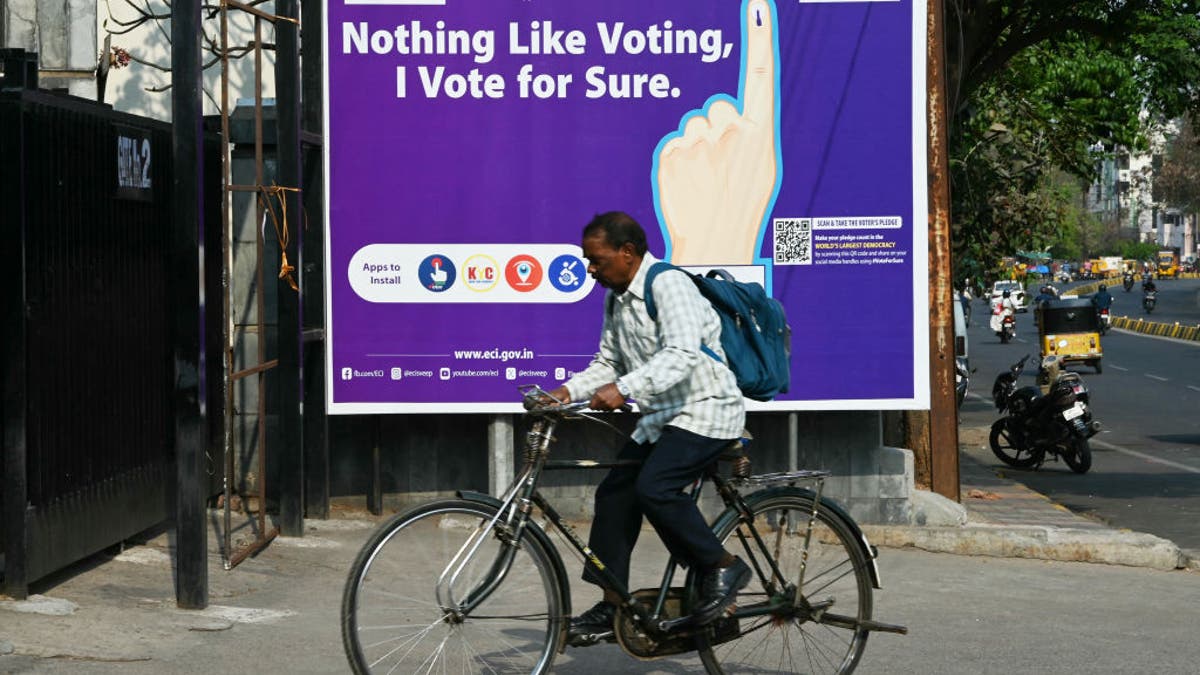
A man rides past an election awareness poster displayed along a street ahead of India’s upcoming general elections, in Hyderabad on March 26, 2024. (Photo by NOAH SEELAM/AFP via Getty Images)
Dubey added, «India’s economy will grow and if you see the projections from big American companies, India is a key place for investment.»
Former University of Delhi, Indian history professor Preeti Singh told Fox News Digital that, «Modi’s support in India transcends the differences in income levels, social categories and caste divisions. His background as a chai walla (tea vendor) has been likened to a common man much like a majority of Indians, and his rise to the top position in India personifies the aspirations of the working classes and all other Indians.»
«His promise and delivery of clean politics, corruption-free government and improved infrastructure have increased his popularity cutting across all classes and categories of society.»
PUTIN SUGGESTS ADDING INDIA OTHER COUNTRIES TO UN SECURITY COUNCIL
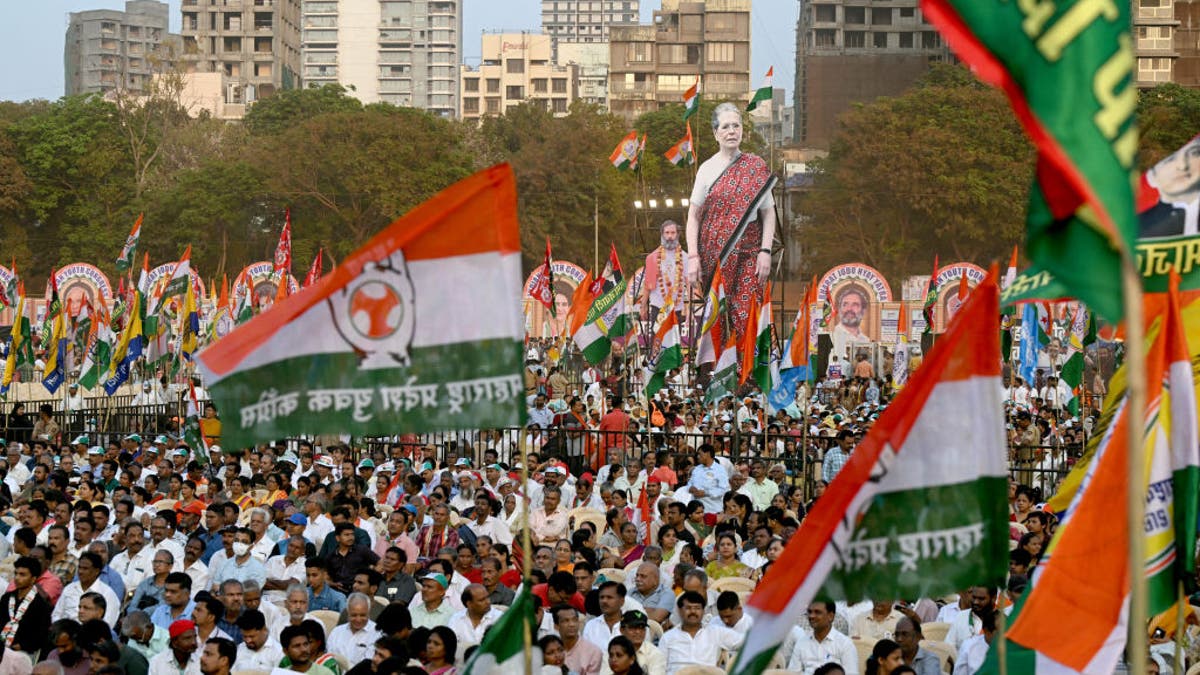
Large cutouts of India’s Congress party leaders Sonia Gandhi and her son Rahul Gandhi are displayed behind their supporters during an election campaign rally ahead of the country’s upcoming national elections in Mumbai on March 17, 2024. India announced on March 16, that national polls would begin on April 19, with Hindu-nationalist Prime Minister Narendra Modi strongly favored to win a third term in the world’s biggest democracy. (Photo by INDRANIL MUKHERJEE/AFP via Getty Images)
Strong foreign relations have been a cornerstone of Modi’s tenure as prime minister. He has undertaken many foreign visits across the globe. Modi has also notably maintained ties with major world powers that rival one another. Singh explained, «Modi is clearly sticking to ‘neutrality’. He wants to make it clear that India is trying to break the shackles by conveying that major players such as the U.S. and Russia have their independent value in terms of Indian foreign policy.»
Likewise, Modi has also maintained relationships with Israel and Iran. In contrast, India’s biggest political rivals historically continue to be Pakistan and China.
Singh also noted how India’s role during the ongoing Russia-Ukraine conflict was «rooted in strategic neutrality, while also condemning civilian killings that had taken place.»
Rumela Sen, political science lecturer at Columbia University, expressed concern as to the BJP government’s «rewriting Indian history» to fit a Hindu nationalist narrative as «a battle for the soul of India». She cited «textbook revisionism on caste» and the «‘sanitization’ of independence hero Gandhi’s killer»(Nathuram Godse) as examples.
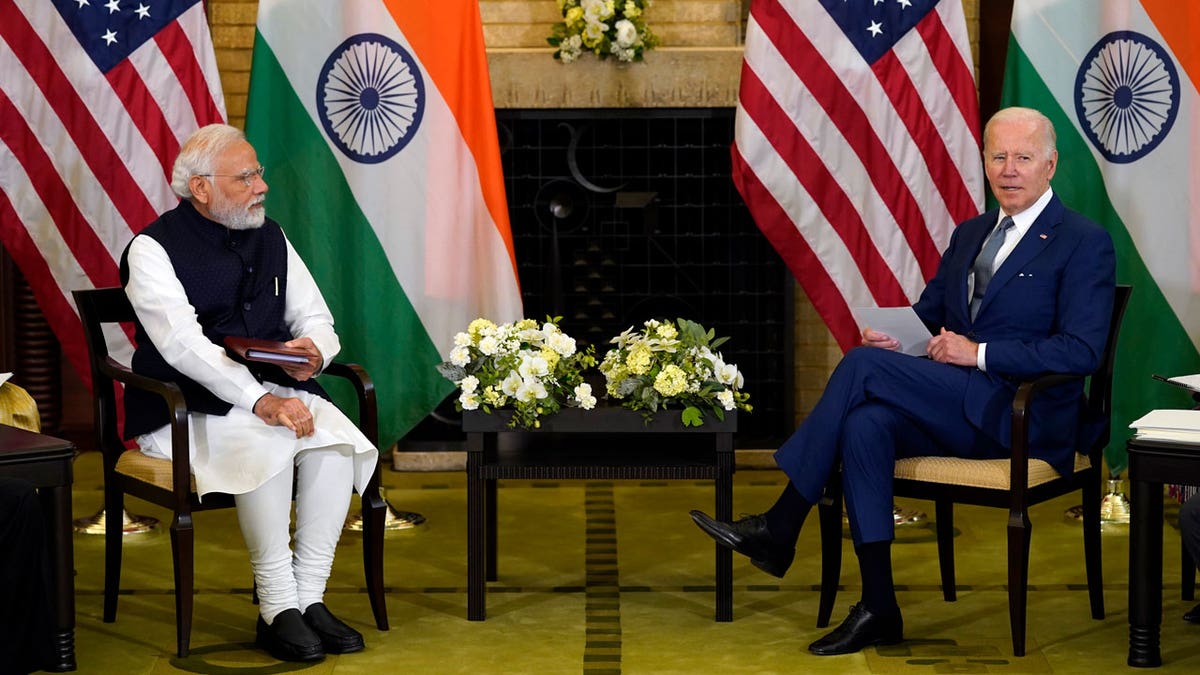
President Biden, right, meets with Indian Prime Minister Narendra Modi during the Quad leaders summit at Kantei Palace, May 24, 2022, in Tokyo. (AP Photo/Evan Vucci, File)
She said that the BJP’s actions «undermine several institutions and rights that were hallmarks of Indian democracy.»
«We almost do not notice the centralization of power in the hands of the executive, midnight arrests and legal harassment of opposition and critics and erosion of free press.»
When asked about concerns of eroding democracy and a crackdown on the opposition in India, State Department spokesman Matthew Miller told journalists on Monday that, «India is the world’s largest democracy, it is an important strategic partner of the United States, and I expect that to remain true.»
CLICK HERE TO GET THE FOX NEWS APP
Despite criticism, Narendra Modi has so far proven that his support-base is solidly rooted in both the domestic and foreign fronts. Also, coupled with a weak opposition and poll results, all indicators suggest that Modi will most probably be re-elected for a third term.
Results of the 44-day-long process will be known on June 4.
The Associated Press contributed to this report.
-

 POLITICA2 días ago
POLITICA2 días agoLa irónica respuesta de Martín Menem a Malena Galmarini: “Si te animas a salir un poco de zona norte…”
-

 POLITICA3 días ago
POLITICA3 días ago«Pará la demanda, Jorge»: el diálogo entre Patricia Bullrich y Jorge Lanata por la denuncia del periodista contra Javier Milei
-

 POLITICA2 días ago
POLITICA2 días agoATE anunció que bloqueará las rutas de Río Negro para intentar impedir la llegada de Milei a Bariloche
-

 POLITICA2 días ago
POLITICA2 días agoInquilinos en la era Milei: Contratos hasta un 60 por ciento más caros y actualizaciones mensuales
-

 POLITICA2 días ago
POLITICA2 días agoLa UBA se declaró en emergencia presupuestaria y restringió el uso de la luz y el gas
-

 SOCIEDAD2 días ago
SOCIEDAD2 días agoEl Gobierno anunció que las prepagas van a dar marcha atrás con los aumentos en las cuotas


























